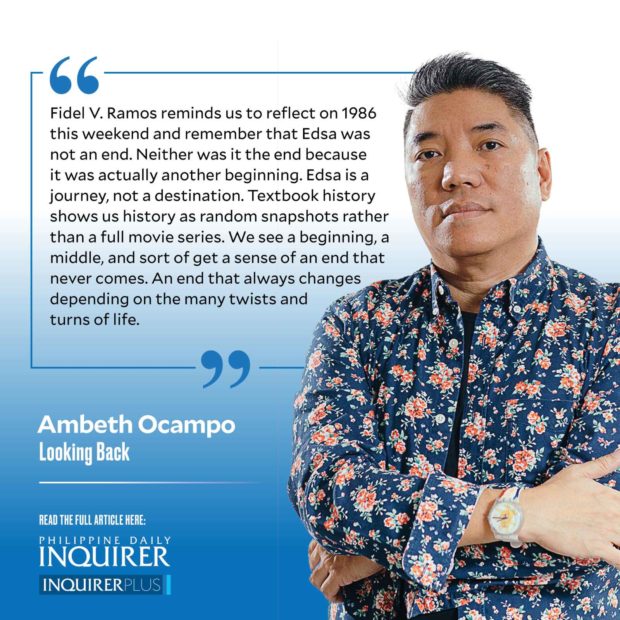Today, depending on the results of the coming elections, may be the last commemoration of Edsa 1986. Those who took part in that significant moment in our history look back with nostalgia first before accepting the reality of broken promises that followed, the unfulfilled hopes that brought us to today’s crossroads. While Edsa may just be a tarnished memory in the present, we should not forget the dark days of corruption and misrule that it ended. If the Marcos years were truly “the golden age” of the Philippines why did Edsa happen? Why were the Marcoses exiled in 1986?
Most of the main players at Edsa have passed on but the two who made Edsa happen, Juan Ponce Enrile and Fidel V. Ramos, are still around. Enrile has since published a 754-page memoir as told to the late Nelson Navarro, while the mountain of documentation on Ramos is slowly being digitized and organized for research and perhaps a comprehensive biography in the future. In November 2003, the Japanese newspaper Nihon Keizai Shimbun (Nikkei) ran 30 newspaper column-length essays by former president Fidel V. Ramos as a daily series entitled “My Personal History.” It has not been published in English and when revised, expanded, and documented, forms the core of either an autobiography (covering his entire life up to the time of writing) or a memoir (selected parts from his life).
Ramos meeting with destiny came in the afternoon of Feb. 22, 1986. He recalled that:
“… my intelligence network reported that Defense Minister Juan Ponce Enrile and his security group would be arrested for allegedly plotting a coup against the president. At about three o’clock p.m., I received a series of phone calls in my home in Alabang … the first ones confirmed what was earlier reported about the impending arrest of Enrile and the last call was from Enrile himself.
“‘The time has come,’ he said in an excited voice. ‘Eddie, are you with me?’ I did not hesitate and answered quickly, ‘Yes I am with you, Sir’… ‘The time’ meant the moment to rebel against the president and his administration. I was well aware of the considerable risks. If General Ver and his cohorts could manage to neutralize or dispose of me, that would be a serious blow to the AFP reform movement being quietly pushed by a number of courageous generals, idealistic young officers, and a good number of the rank-and-file soldiers who were increasingly critical of Marcos … There was no time to lose. I quickly packed a few things, kissed my wife and daughters goodbye, and left the house … took a circuitous route from the house to shake off any surveillance teams and arrived at about 6 p.m. at he Ministry of National Defense in Camp Aguinaldo.”
The rest is history, Enrile and Ramos gave a joint press conference with the latter declaring “withdrawal of support from the Commander-in-Chief [Marcos] stating that the AFP under General Ver was no longer protecting the people and upholding the law … I flatly asserted over the international media that Marcos and Ver no longer deserved to exercise command over the AFP because they had lost the moral authority to do so.”
Forty-eight hours after, Cardinal Sin called on the people to gather at Edsa: “More than a million people … filled up Edsa waving flags, bouquets of flowers, rosaries, and religious relics. The crowds effectively blocked tanks intent on moving towards the camps … It was all over in four days—done peacefully, non-violently through People Power and the benevolence of Divine Providence. President Marcos and his family were flown from Malacañang to Clark Air Base by US helicopters night of Feb. 25, and the following day were airlifted to Hawaii. We, the people, had won—but the rebuilding of our democracy had just begun!”
Ramos’ last line is significant and needs detailed elaboration. Ramos reminds us to reflect on 1986 this weekend and remember that Edsa was not an end. Neither was it the end because it was actually another beginning. Edsa is a journey, not a destination. Textbook history shows us history as random snapshots rather than a full movie series. We see a beginning, a middle, and sort of get a sense of an end that never comes. An end that always changes depending on the many twists and turns of life.
—————-
Comments are welcome at aocampo@ateneo.edu
